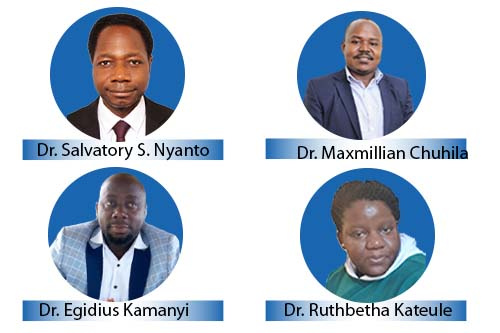Four UDSM Lecturers appointed Visiting Scholars in Cambridge, Warwick and Montpellier
By Special Correspondent, CMU,
Four lecturers of the University of Dar es Salaam – two from the College of Humanities (CoHU), one from the College of Social Sciences (CoSS) and another from the College of Information and Communication Technologies (CoICT), have been appointed as Visiting Scholars at the universities of Cambridge, Warwick and Montpellier in the United Kingdom and France.
The information about these appointments, which the UDSM Communication and Marketing Unit was made aware of recently, reached the four lecturers between the end of last year 2022 and early this February, 2023.
The two appointees from CoHU are senior lecturers from the Department of History namely Dr. Salvatory S. Nyanto who will serve as a visiting fellow at the Faculty of Divinity, University of Cambridge, in the United Kingdom between October 2023 and January 2024, and Dr Maxmillian Chuhila as a visiting professor from January to March, 2023 at the Institute of Advanced Study, University of Warwick, in the United Kingdom as well.
The other two lecturers, who were appointed as visiting scientists of the 2023 cohort (among the four cohort members) at the University of Montpellier in France include Dr. Egidius Kamanyi from the CoSS Department of Sociology, and Dr. Ruthbetha Kateule from the Department of Computer Science and Engineering, CoICT.
Such a noble opportunity
According to Dr. Chuhila, who is already in the UK at the University of Warwick, the visiting fellowship opportunity he had received was very useful in his academic career as it had offered him a chance to give a seminar at the popular Global History and Culture Centre (GHCC) in March 2023.
Meanwhile, Drs. Kamanyi and Kateule said the 6-month fellowship from January to June, 2023, at the University of Montpellier was such a noble opportunity for them to interrogate, their 2023 cohort theme: what roles for science in crisis times? Outlook in the health, environment and agriculture interconnected areas.
In line with this theme, according to the information released on the University of Montpellier website, Dr. Kateule contribution to this cohort theme would be ‘the role of ICT in agriculture for effective crisis management’, while Dr. Kamanyi's focus would be ‘uncovering hidden struggles among disaster survivors in Tanzania: Are they vulnerable survivors or resilient victims?’.
On his part, Dr. Nyanto, who has researched extensively in the areas of Religion and Empire; Slavery and Missionaries; and Christian-Muslim relations, said he was grateful for the opportunity and promised to work outstandingly in this position for the benefits of UDSM, and academic career at large.
“While at Cambridge, I will utilize resources available to complete the revision of the book manuscript on slave emancipation and Christian communities in post-abolition Tanzania, which is under contract with James Currey, an imprint of Boydell and Brewer based in Oxford, Suffolk and London. I will draw on the library of the Center of African Studies, University of Cambridge Library, and the Divinity Faculty Library”, said Dr. Nyanto.
Dr. Nyanto is currently a member of the Editorial Board of African History Review, Director in the Office of the Vice Chancellor and chair of the editorial team for the book project on the History of Post-Colonial Tanzania. He is also the coordinator of AFRAB project, an academically-led 5-year research project funded by the European Research Council (ERC) under the European Union’s Horizon 2020 research and innovation program and located in the History Department of University College London (UCL) and the Department of History of the University of Dar es Salaam.
Other News
Fri, 20.Dec.2024 : ALAF Limited yatoa ufadhili wa masomo ya Umahiri katika Kiswahili kwa wanafunzi wa UDSMThu, 19.Dec.2024 : UDSM Herbarium: an invaluable resource fostering conservation, plant taxonomy and ecology
Sat, 14.Dec.2024 : Tracer study findings stress on curriculum to meet national human resource needs
Sat, 14.Dec.2024 : Prof. Mushi calls for ethical and inclusive innovation as Africa higher education leverages AI
Fri, 13.Dec.2024 : UDSM kuwa kituo cha utafiti wa Sayansi ya Bahari barani Afrika
Fri, 13.Dec.2024 : Multi-billion Sida funds to boost research on sustainable development at UDSM
Fri, 06.Dec.2024 : University of Bradford offers honorary degree to Prof. Ichumbaki for impactful research, community engagement
Wed, 04.Dec.2024 : The Voice of Social Sciences ponders varsities, scholars role to address global uncertainties


